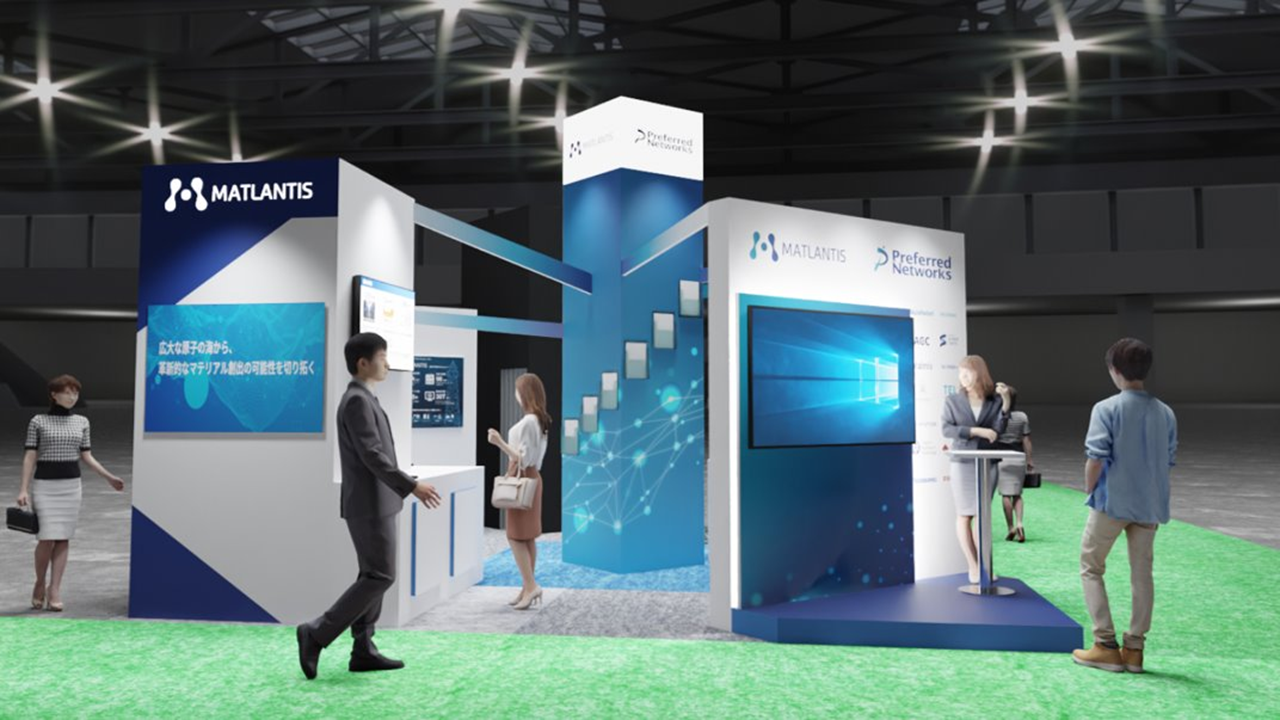Past News
User Community
Online2023.4.21 (JPN)
The 2nd "Matlantis User Conference" was held
We will be holding the second Matlantis User Conference.
This time, two Matlantis users will be on stage to talk about specific examples of how they use Matlantis.
This users' meeting is also open to those who are considering using Matlantis or would like to try it in the future. However, since the program does not include an introduction to the basic functions of Matlantis, you will be able to enjoy the content even more if you check the overview of Matlantis (Atomistic simulation tutorial, Chapter 1 Introduction) before participating.
Date and time/How to participate
| Date and time | Friday, April 21, 2023 13:00-14:40 |
| place | Online (Zoom) |
| Participation fee | Free (pre-registration required) |
| Capacity | 500 attendees |
| Application Deadline | Monday, April 17, 2023 |
| Application Form | https://pfcc.connpass.com/event/276618/ |
Timetable
| 13:00 – 13:05 | opening Preferred Computational Chemistry, Inc. Rabi Shibata |
| 13:05 – 13:55 | User Case 1 Tokyo Institute of Technology Professor Kan Hatakeyama |
| 13:55 – 14:35 | User Case 2 Professor Kaoru Kyuma, Shinshu University |
| 14:35 – 14:40 | Closing Preferred Computational Chemistry, Inc. Rabi Shibata |
Content Introduction
User Case 1
title
Matlantis used by organic materials researchers
Speakers
Tokyo Institute of Technology, School of Materials and Chemical Technology, Materials Course, Hayakawa Laboratory, Assistant Professor, Dr. Kan Hatakeyama
Biography: Completed the doctoral program in the Department of Advanced Science and Engineering at Waseda University in 2018. Ph.D. (Engineering). In the same year, he became a lecturer (with fixed term) in the Department of Applied Chemistry at the same university, and assumed his current position in April 2023. Since 2022, he has been working in the JST Emergent Research Support Program. He specializes in functional polymers, organic electrochemistry, and materials informatics.
Overview of the lecture
This presentation will discuss the expectations and awareness of issues that experimental researchers specializing in the synthesis and measurement of functional polymers have when using the AI molecular simulator Matlantis. The features of Matlantis will be considered from an experimentalist's perspective, with comparisons to DFT, MD calculations, and even open source AI simulators. As examples, in addition to structural calculations of molecular assemblies, the accuracy and processing speed of calculations of various physical properties (density, diffusion coefficient, viscosity, thermal conductivity, etc.) that can be estimated by this software will be shown for actual materials. In addition, the status of collaboration with machine learning to estimate structures and physical properties that are difficult to calculate even with Matlantis will be reported.
User Case 2
title
Simulation of dynamics under electric field using partial charges of PFP
Speakers
Assistant Professor, Shinshu University Research Institute for Materials Science
Biography: Graduated from the Department of Mechanical Engineering, Faculty of Engineering, The University of Tokyo (2012) and completed a doctoral course in mechanical engineering at the Graduate School of Engineering, The University of Tokyo (2014). After working at Toshiba Corporation/Toshiba Energy Systems & Solutions, he completed his doctoral course in mechanical engineering at the Graduate School of Engineering, The University of Tokyo. After working as a researcher at the Department of Pure and Applied Sciences, University of Tsukuba, he has been in his current position since October 2021.
Overview of the lecture
The behavior of materials in an external electric field, such as ionic conduction under an electric field and the formation of an electric double layer at an electrode interface, is interesting from a physicochemical perspective and is also important for applications such as secondary batteries and capacitors. These can be analyzed by molecular dynamics simulations, but it is difficult to calculate on a sufficient time scale using first-principles calculations such as density functional theory (DFT) for intermolecular interactions because of the high computational cost. In addition, the use of conventional empirical potentials has issues such as the low versatility of parameters, which limits the applicable material systems, and the difficulty of modeling including chemical reactions. Therefore, we aimed to solve the problem by applying PFP, a general-purpose neural network potential, improving the balance between calculation speed, versatility, and accuracy, while providing interactions with an external electric field based on the partial charge estimation. In this presentation, we will introduce such an extension of Matlantis to dynamics under an electric field.
Notes
We may decline your application to participate in the Matlantis User Conference at our discretion, for example if we receive an application from a competitor. We appreciate your understanding in advance.
公開日:2023.02.27



